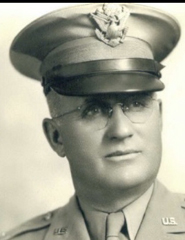Descends Mountain to See Miles
By Frank Miles
With the 5th Army in Italy, Feb. 24 -- (IDPA) The anti-aircraft outfit was located in the snowy Apennine mountains where its guns protect against the nazi sky raid on important American positions.
"Here comes a man from Iowa," an Ohio G.I. informed me, indicating an approaching comrade, in answer to my inquiry when I reached the place after a long hike.
Sgt. Ernest Nelson, Scranton, was the Hawkeye. He was tall, blue-eyed, ruddy and sandy-haired. Flashing a smile as he pushed back his helmet, he gave me a hearty hand shake.
The sergeant had been in the army 28 months and in 27 months overseas, he had shot at enemy planes in Africa, Sicily and Italy. A few nights earlier, he and is buddies had fired at a nazi craft which dropped anti-personnel bombs. That kind of bomb is small but explodes with terrific force. It hurls pieces of steel.
He has 3 brothers in service -- Staff Sgt. Norman in the army air corps in Italy; Martin in the navy in South Pacific, and Stanley Nelson in the navy in England.
He said Pvt. Adolph Madsen, Humboldt, and T/5 Lewis Keith, Jefferson, were in his outfit.
"Two other Iowa guys near maybe you can see," he added. "T/5 John Healy, Victor and T/4 Edward Holland, What Cheer."
He rang a field telephone and took down the receiver. Soon he had Healy on the line. Healy suspected kidding when told an Iowa scribe was there, refused to answer any questions and finally announced he'd come down and see for himself. To "come down" meant a trudge down a slope in knee deep snow. In 5 minutes he arrived. Holland couldn't leave his post. Healy was a tall, black-eyed, handsome youngster and had a brother in the navy, Pharmacist's mate 2/c, Harry Healy.
Holland on the phone said his brother, Pfc. Robert Holland, was a medic in France.
Healy and Holland were in a signal corps radar maintenance group. Both had been overseas 23 months. Madsen and Keith came across with Nelson and had been with all the way.
The men slept in tents, ate in the one intact room left in a shell shattered dwelling and spent many more hours on duty at night than in the day time.
1st Lt. Ralph O. Hoven, 29, Conrad, had been made commander of company H, of the 168th infantry, in which he entered military service as a private. A former Iowa national guardsman, he came overseas in April of 1942, as an enlisted man. He was a mortar gunner squad leader and a platoon sergeant, and received a battlefield promotion to second lieutenant in December of 1943. He served in Ireland and Scotland, was in the original landing at Algiers, fought through Faid Pass, Kondouk, Sidi, Nsir, Edde Khila and Hill 609 in the Tunisian campaign. He had been in every battle of his regiment in Italy,. The Iowan wears the silver star for gallantry in action, 4 stars on his European theater ribbon and the combat infantryman badge. Two brothers joined the regiment with him. One, a former first sergeant, is in the states on rotation, another is a corporal and mortar gunner in Company H, and a third is an infantryman in the European theater.
Pfc. William R. Collier, Council Bluffs, was recently cited for "exceptionally and meritorious service" by his 1st armored division commander, Maj. Gen. Vernon E. Prichard, a native of Onawa.
When the lead mule of a rations train Collier was guiding got panicky under enemy fire and slid down the cliff, the youth went after the animal, brought him back, calmed him down and completed the mission.
Source: Mason City Globe-Gazette, March 1, 1945
![]()

